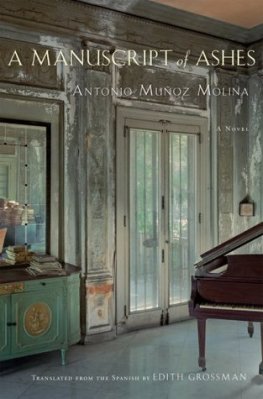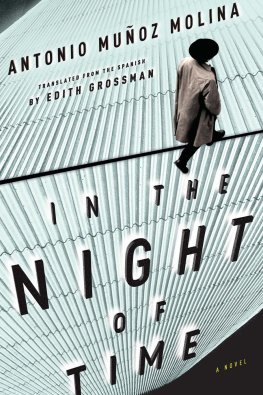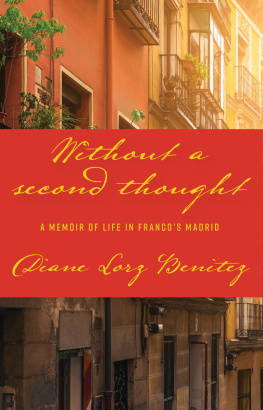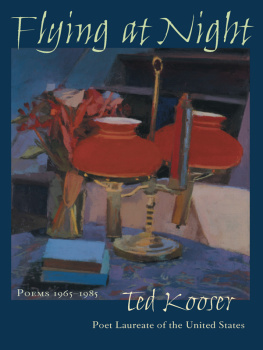Antonio Munoz Molina
Sepharad
Mixing memory and desire.
T. S. ELIOT
SHE CLOSED THE DOOR very slowly and went out with the stealth of someone leaving a sick person who has just fallen asleep at midnight. I listened to her slow steps along the hallway, fearing or wishing she would return at the last minute to leave her suitcase at the foot of the bed and sit down on the edge with a gesture of surrender or fatigue, as if she had already returned from the journey she had never been able to take until tonight. When the door closed the room was left in darkness, and now my only illumination is the thread of light that enters from the hall and slides in a tapering line to the legs of the bed, but at the window there is dark blue night and through the open shutters comes the breeze of a night that is almost summer, crossed in the far distance by the whistles of express trains that travel under the moon along the livid valley of the Guadalquivir and climb the slopes of Magina on their way to the station where he, Minaya, is waiting for her now without even daring to hope that Ins, slim and alone, with her short pink skirt and her hair pulled back into a ponytail, will appear at a corner of the platform. He is alone, sitting on a bench, smoking perhaps as he looks at the red lights and the tracks and the cars stopped at the end of the station and of the night. Now, when she closed the door, I can, if I want, imagine him for myself alone, that is, for no one, I can bury my face beneath the turned-down bedclothes that Ins smoothed with so much secret tenderness before she left, and then, waiting in the darkness and in the heat of my body under the sheets, I can imagine or recount what happened and even direct their steps, those of Ins and his, on the way to their encounter and mutual acknowledgment on the empty platform, as if at this moment I had invented and depicted their presence, their desire, and their guilt.
She closed the door and didn't turn around to look at me because I had forbidden it, I saw for the last time only her slender white neck and the beginning of her hair, and then I heard her steps fading as they moved away to the end of the hallway, where they stopped. Perhaps she put the suitcase on the floor and turned back to the door she had just closed, and then I was afraid and probably wished she wouldn't continue, but in an instant the footsteps could be heard again, farther away, very hollow now, on the stairs, and I know that when she reached the courtyard she stopped again and raised her eyes to the window, but I didn't look out because it was no longer necessary. My consciousness is enough, and the solitude, and the words I say quietly to guide her to the street and the station where he doesn't know how not to go on waiting for her. It is no longer necessary to write in order to guess things or invent them. He, Minaya, doesn't know that, and I suppose that some day he will succumb, inevitably, to the superstition of writing because he doesn't recognize the value of silence or blank pages. Now as he waits for the train that, when this night ends and he arrives in Madrid, will have taken him away forever from M gina, he looks at the deserted tracks and the shadows of the olive trees beyond the adobe walls, but between his eyes and the world, Ins and the house where he met her persist, along with the wedding portrait of Mariana, the mirror where Jacinto Solana looked at himself as he wrote a poem laconically entitled "Invitation." Like the first day, when he came to the house with the ill-fated melancholy of a guest who has recently gotten off the worst trains of the night, Minaya, in the station, still contemplates the white facade from the other side of the fountain, the tall house half hidden by the mist of water that rises and falls back into the overflowing stone basin and sometimes goes higher than the rounded tops of the acacias. He looks at the house and senses behind him other glances that will converge there to expand its image by adding the distance of all the years that have passed since it was built, and he no longer knows if he remembers it himself or if rising in front of his eyes is the sedimented memory of all the men who have looked at it and lived in it since long before he was born. Undeniable perception, he thinks, amnesia, are gifts possessed completely only by mirrors, but if there were a mirror capable of remembering, it would be set up before the facade of the house, and only it would have perceived the succession of what was immobile, the fable concealed beneath the stillness of closed balconies, its persistence in time.
At nightfall yellow lights are lit at the corners, which don't illuminate the plaza but only sculpt in the dark the entrance to a lane, brighten a patch of whitewash or the shape of a grating, suggest the doorway of a church in whose highest vaulted niche there is a vague Saint Peter decapitated by the rage of another time. The church, closed since 1936, and the headless apostle who still lifts an amputated hand in blessing, give the plaza its name, but the width of the plaza, never opened and very rarely disturbed by cars, is defined by the palace. The palace is older than the acacias and the hedges, but the fountain was already there when it was built, brought from Italy four centuries earlier by a duke who was devoted to Michelangelo, as was the church and its gargoyles, black with lichens, who when it rains expel water onto the street as if it were vomit. From the plaza, behind the trees, like a casual traveler, Minaya looks at the architecture of the house, still hesitating at the bronze door knockers, two gilded hands that strike the dark wood and produce a somber, delayed resonance in the courtyard, under the glass dome. Marble flagstones, white columns supporting the glass-enclosed gallery, rooms with wooden floors where footsteps sounded as they would in a ship's cabin, that day, the only one, when he was six years old and they brought him to the house and he walked on the mysterious parquet floor as if he were finally stepping on the material and dimensions of a space worthy of his imagination. Before that afternoon, when they walked through the plaza on their way to the Church of Santa Maria, his mother would squeeze his hand and walk faster to keep him from stopping on the sidewalk, trapped by the desire to stay there forever looking at the house, imagining what was behind the door that was so high and the balconies and the round windows at the top floor that lit up at night like the portholes of a submarine. At that time Minaya perceived things with a clarity very similar to astonishment and was always inventing mysterious connections among them that didn't explain the world to him but made it inhabited by fables or threats. Because he observed his mother's hostility toward the house, he never asked her who lived there, but once, when the boy went with him to visit someone, his father stopped next to the fountain and with the sad irony that was, as Minaya learned many years later, his only weapon against the tenacity of his failure, he said:
"Do you see that big house? Well, my cousin Manuel, your uncle, lives there."
From then on, the house and its mythological resident acquired for him the heroic stature of a movie adventure. Knowing a man lived in it who was inaccessible and yet his uncle produced in Minaya a pride similar to what he felt at times when he imagined that his real father was not the sad man who fell asleep every night at the table after making endless calculations in the margins of the newspaper, but the Coyote or Captain Thunder or the Masked Avenger, a comic book character dressed in dark clothing and almost always wearing a mask, who one day, very soon Minaya hoped, would come for him after a very long journey and return him to his true life and the dignity of his name. His father, the other one, who almost always was a shadow or a melancholy impostor, sat on one of the red easy chairs in his bedroom. The light had red tonalities when he closed the curtains, and on a pink background, as if in a camera obscura, small inverted silhouettes were outlined on the ceiling in the warm semidarkness: a boy with a blue apron, a man on horseback, a slow cyclist, as detailed as a drawing in a book, who glided, head down, toward an angle of the wall and disappeared there behind the blue boy and the tenuous rider who preceded him.












